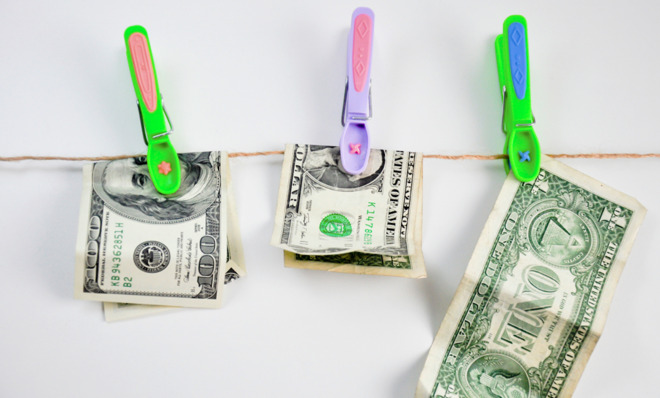I was raised by a cheapskate. And I couldn't be more grateful.
At a young age, I learned the value of pinching pennies

A free daily email with the biggest news stories of the day – and the best features from TheWeek.com
You are now subscribed
Your newsletter sign-up was successful

When I moved to New York after graduating from college in 2005, one of the things I left in Tampa was my car. My father, who was quick to remind me of who'd made all the payments, reclaimed it with the cold authority of a repo man.
"Sorry, kid. The car's in my name," he said. "And if you think you're taking it up to New York with you, you've got rocks in your head."
This is a favorite saying of his, the having rocks in your head thing. Paying full price for cable, reporting cash tips on your tax return, moving to the most expensive city in the world — people who willingly do these things have rocks in their head.
The Week
Escape your echo chamber. Get the facts behind the news, plus analysis from multiple perspectives.

Sign up for The Week's Free Newsletters
From our morning news briefing to a weekly Good News Newsletter, get the best of The Week delivered directly to your inbox.
From our morning news briefing to a weekly Good News Newsletter, get the best of The Week delivered directly to your inbox.
Even so, I was hoping to sell the car and roll over the money to cover my rent in New York while I looked for a writing job. Having it swept out from under me had thrown a real wrench in my plans, but in Lou Hayes' opinion, it was his car fair and square.
I couldn't say I was surprised by the way it had all panned out. In fact, I can still think of no greater scam than to have somehow tricked my father into financing my move to New York. It wasn't that he didn't support the idea of me pursuing my dreams in the big city — he just didn't support the idea of footing the bill.
A self-described "knockaround guy," my father simply couldn't relate to the idea of a free ride, probably because he was never given one.
As Father's Day rolled around this year, I couldn't help but look back on all the things I've inherited from my dad. Aside from my freckles, the number-one trait is certainly my attitude toward money.
A free daily email with the biggest news stories of the day – and the best features from TheWeek.com
Growing up with a cautious spender
My dad came of age in a working-class Brooklyn neighborhood in the 1950s, where both opportunity and money were equally hard to come by. If he wanted new sneakers, he waited for his older brother to outgrow his. If he got a cavity, it meant months of toughing it out while his mother quietly snuck money away from her husband for a dental visit.
Unlike his own children, my dad knew what it felt like to walk to school with holes in his shoes, the weight of hunger heavy in his belly. My grandfather's belt served as a reminder of what happened to those who squandered what little money they had.
"That's just how it was in them days," he'd say casually. But while time and circumstance have lifted him far beyond his days on Flatbush Avenue, the imprint it left behind runs deep
In spite of his upbringing, or perhaps because of it, my dad was determined to spin a better life for his own kids. In the process, he clung to the idea that nothing (particularly money) was to be wasted — a principle that came to dictate my childhood.

With regard to stomping out financial recklessness, subtlety wasn't my father's strong suit. In the midst of a 100-degree Florida summer, you'd never hear my dad request that we please be mindful of the energy bill. Instead, he'd simply tell us to quit leaving the (you know what) front door open while the air conditioner was running. End of story.
The same went for wasting food. When my mother went back to work, preparing meals for us kids fell on my father. When Mom had been in charge, she'd fill up the grocery cart without a second thought. We were even allowed a small extravagance from the supermarket toy aisle under the condition that we didn't tell our father.
When Dad took over the shopping, it meant hitting the big-box stores with coupons in hand. "And don't eat all the cold cuts in the fridge before we go," he'd instruct us before leaving the house. "You can fill up on free samples at the store."
While Mom didn't mind spending a little more on the finer things, Dad was the budgeting king. Our mother had no problem tossing milk that was one hour past the expiration date. Dad, on the other hand, would make a big to-do about finishing off the carton in his morning coffee just to prove a point. "I'll take my chances with the milk," he'd say.
My relationship with money takes shape
Our household was one divided by two schools of thought. My mother: Live it up and spend away. My father: Watch your spending and save, save, save.
As you can imagine, this led to some pretty mixed messages when it came to money. Was it to be enjoyed? Feared? Looked at with suspicion? And why were they fighting about it all the time?
As a child, I couldn't quite wrap my head around the basic fundamentals of money. In the fifth grade, our class took a field trip to a place called Enterprise Village (a mock community designed to teach us about how the economy works). Each child was given a job — grocery store worker, news reporter, banker — along with a checkbook. After a day of pretend-work, we were rewarded with a make-believe paycheck and encouraged to spend it at one of the local vendors on site. Our teachers also emphasized the importance of saving some of it.
The exercise, which was meant to be fun for us 10-year-olds, only stressed me out. How much should I spend, and how much should I save? I paced the aisles of the stores, unsure of which items were really worth my hard-earned cash. I can't remember what I ended up doing with the money, but I do know that the decision was met with worry.
As I grew into a young adult, the gist of this experience only replayed itself in one scenario or another. I am a chronically guilty spender, suffering bouts of buyer's remorse following any purchase I make for myself. Do I really need a haircut? Should I return these shoes? Is happy hour really a necessity today?
When it comes to money, I am continually fraught with indecision. At 31 years old, the only purchases I feel are truly deserved are ones related to basic living expenses or for my children. All others make me feel like I'm selfishly blowing our money.
Morphing into a thrifty parent

Now that I'm raising two kids of my own, my father's voice constantly echoes in my head. You can't spend more than you bring in. Using credit cards is spending tomorrow's money before you even get it. You have to go where your wallet takes you.
The biggest kicker is that he's right, and I know it.
As a teenager, I pegged him as cheap, which I now understand was way off the mark. I protested when he made me get an after-school job. I whined and moaned in college when he wouldn't pay for me to study abroad in Italy. Now I see that he was being smart with his money: We were a middle-class family, and my dad was doing the best with what he had.
This realization has come to light gradually since becoming a parent. Case in point: the family trip we took to Disney World when my oldest was three. After learning that kids ages two and under get in the park free, I remember kneeling down in front of her stroller before approaching the ticket window. "We're going to play a fun game today where we pretend we're two, O.K.?" I whispered.
This was thoroughly confusing for her, but I didn't care. My mom, who had tagged along for the trip, jokingly said I was "pulling a Lou Hayes."
Going to the movies is a similar experience. The girls are kidding themselves if they think we're getting anything from the concession stand. Instead, they know that Mommy's big green bag is for the candy we pick up at the supermarket beforehand.
More and more, I find myself erring in the direction of my dad when it comes to being a fiscally responsible parent. When money is tight and the kids ask to go to a restaurant, I'll often pack a lunch and eat outside at the park. A "girls' picnic," we call it.
My husband gets it and doesn't mind all the penny-pinching. And on some level, we like showing the girls that you don't have to spend a fortune to enjoy the good life. I also like to think that we're communicating a clearer message about money than the one I grew up with.
Today, I look up to my dad (now in his mid-sixties) as a wise money guru. He's not in a whole lot of debt. He lives in a beautiful house on the water. He's got a good amount of cash socked away. In other words, he must have done something right.
And actually, he's a bit less thrifty these days. The fact that his children are no longer on his payroll might have something to do with it. I even catch my parents splurging on themselves more often than they used to. (Granted, it's Mom who initiates most of the splurging, but my dad seems much less resistant these days.)
"In the end, it's only money," I'll even catch him saying now and again. And in the end, I suppose he's right. It is only money. After telling my daughter last week to quit leaving all the lights on (electricity isn't free, for Pete's sake), it dawned on me that maybe I need reminding of that every once in a while.
But then again, I've got rocks in my head, so what do I know?
This story was originally published on LearnVest. LearnVest is a program for your money. Read their stories and use their tools at LearnVest.com.
More from LearnVest...